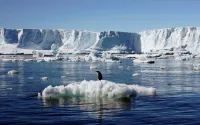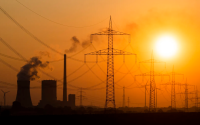19 June 2008The Guardian
 Ice crystals form over a tiny creek, Arctic National Wildlife Refuge. Photographer: Eric Rorer/Getty/Aurora
Ice crystals form over a tiny creek, Arctic National Wildlife Refuge. Photographer: Eric Rorer/Getty/AuroraGeorge Bush, responding to public alarm over soaring petrol prices, yesterday proposed overturning decades-old bans on drilling for oil off the US coast and in the pristine Alaskan wilderness. "There's no excuse for delay," the president told a White House press conference. America was too dependent on countries abroad, many of them in unstable regions.
"Congress must face a hard reality: unless members are willing to accept gas prices at today's painful levels, or even higher, our nation must produce more oil. And we must start now," he said.
Expanding oil extraction off the coast would provide 18bn barrels, enough to supply the US for more than two years. As for Alaska, he said advances in technology meant that oil could be extracted from the Arctic National Wildlife Refuge with "virtually no impact" on the land or wildlife.
His other proposals included extraction of oil from shale in the Green River Basin that lies in Colorado, Utah and Wyoming - a move opposed by environmentalists. Finally, he wants more oil refineries in the US, to reduce imports of refined oil.
The plan has almost no chance of being adopted. Congress, which is controlled by the Democrats, has consistently blocked exploration, for environmental reasons.
The Senate majority leader, Harry Reid, accused Bush of cynicism, saying the US could not drill its way out of the problem. "The math is simple: America has just 3% of the world's oil reserves, but Americans use a quarter of its oil," Reid said.
Bush's proposals are primarily political in a presidential election year in which petrol prices are one of the top issues. The Republican presidential candidate, John McCain, told oil executives in Houston on Tuesday that the ban on oil drilling in coastal waters should be lifted. This is the first major example of McCain and the White House working in tandem.
The Democratic candidate, Barack Obama, opposes the plan, saying it would take a decade before the predicted oil flow would begin. "This is not something that's going to give consumers short-term relief and it is not a long-term solution to our problems," Obama said.
The issue is politically risky for both Obama and McCain. A Reuters/Zogby poll released yesterday showed 60% of Americans support more oil drilling and refinery construction, but the same percentage also say they favour conservation.
In states such as California, where oil companies would like to drill offshore, polls in the past suggest more than 60% are opposed to drilling, with a serious oil spillage in 1969 still remembered. In Florida, one of the key swing states, oil drilling is a sensitive issue too. A poll published yesterday put Obama ahead in the state for the first time, on 47% to McCain's 43%.
Speaking to reporters, Bush, who has close family and business links with the oil industry, said: "Families across the country are looking to Washington for a response." He blamed Democratic opposition for the high petrol prices. "I know the Democratic leaders have opposed some of these policies in the past. Now that their opposition has helped drive gas prices to record levels, I ask them to reconsider."
Obama was scheduled to hold his first meeting later in the day in Washington with a working group on national security, advisers who will meet regularly until the election and will form a pool from which he could pick foreign specialists for his administration. The group includes Bill Clinton's former secretary of state, Madeleine Albright, and Obama's two main foreign affairs advisers, Tony Lake and Susan Rice. He is to meet afterwards with about 40 former admirals and generals to discuss Iraq, Afghanistan and other potential conflicts.






